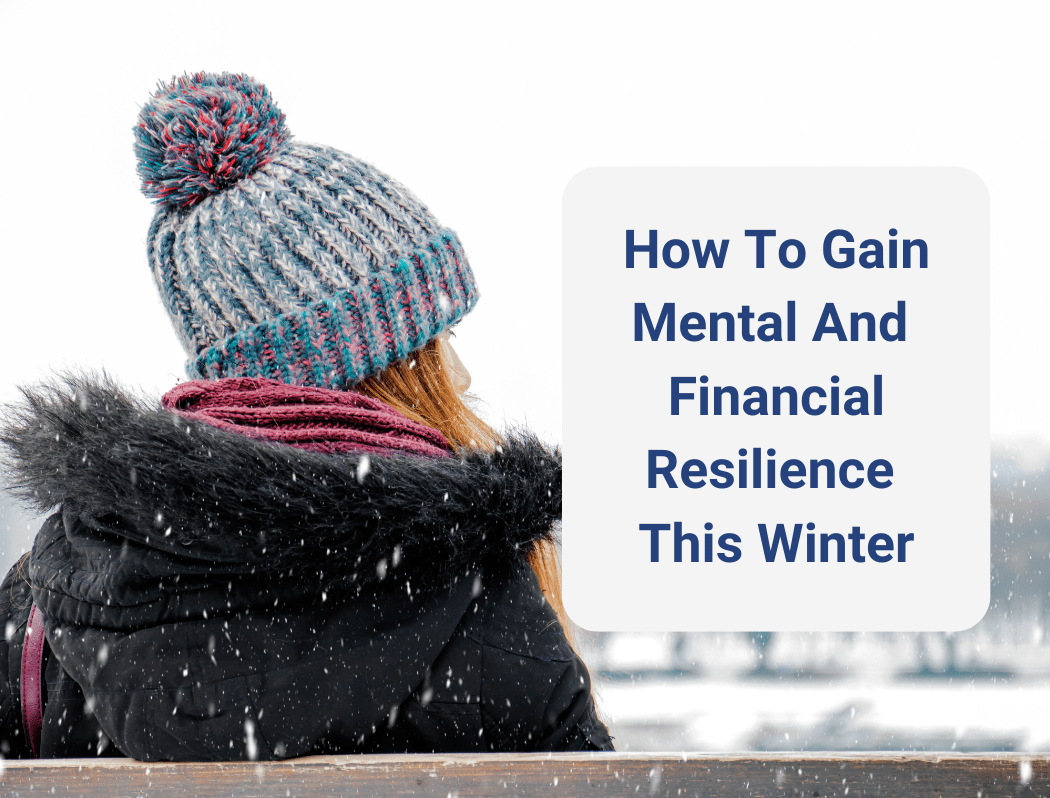How to gain mental and financial resilience this winter
Christmas is fast approaching…
 For many of us, it signifies excitement, joy, family connection, love, and kindness. However, despite the delight that the festive season brings to many, not everyone shares the ebullience that it brings. In fact, Christmas can be a notoriously burdensome time, particularly if you have difficulties with mental health.
To some, Christmas is a time of stress that derives from a multitude of different factors, including financial pressure, increased food and alcohol intake, stark reminders of deceased family members, complex family dynamics and more. This concoction of aggravating factors can take a severe toll on mental and physical health.
For many of us, it signifies excitement, joy, family connection, love, and kindness. However, despite the delight that the festive season brings to many, not everyone shares the ebullience that it brings. In fact, Christmas can be a notoriously burdensome time, particularly if you have difficulties with mental health.
To some, Christmas is a time of stress that derives from a multitude of different factors, including financial pressure, increased food and alcohol intake, stark reminders of deceased family members, complex family dynamics and more. This concoction of aggravating factors can take a severe toll on mental and physical health.
Falling temperatures and shorter days can also have a profound impact on our mood and well-being, with many people sleeping more, experiencing appetite changes and finding it more difficult to enjoy things they normally would. If you’re one of the people who find this time tough, we hope we can offer some insight into building resilience. Well-documented studies show resilience-building is extraordinarily effective in protecting overall mental health and regulating stress levels. But what exactly is resilience? How can you start building resilience?
- 1-4 in four people experience a problem with their mental health each year in the UK, with many issues developing during the autumn and winter.
What exactly is resilience?
In its purest form, resilience is the process and outcome of withstanding adversity. The ability to adapt to challenging life experiences, bounce back from them and grow. For most of us, resilience is a natural state, but there are many cases where people still struggle with it. The good news is it’s a skill that can be learnt, practised, and continually improved. Resilience is often likened to muscle; just as you can build muscles through exercise, you can build your resilience in the same way.Key benefits of resilience
There is an abundance of benefits to learning resiliency, and it’s a critical skill to develop in the world we live in today. Often, we find ourselves in fast-paced environments littered with unexpected situations and daily conundrums that each of us needs to overcome.- Life satisfaction
- Increased levels of success
- Improved capacity for learning and personal development
- Ability to take control of risk-taking behaviours like drinking too much alcohol or consuming drugs
- Manage your finances effectively
- Overall increased mental well-being invariably leads to a fuller, longer life
Actionable ways to grow mental and financial resilience over Christmas
Practice mindful spending and budget finances
Knowing what you can afford before splurging out on Christmas can help prevent overspending and relieve unnecessary financial stress. If you regularly feel financial pressure during the festive season or in general, it’s fundamental to remember that you are not alone. For example, in a poll conducted by the Mental Health Foundation, it was discovered that one in ten people in the UK feel hopeless about their financial circumstances and more than one-third feel anxious about their finances. The best thing to do is to create a budget plan, so you understand the limits of your spending and stick to it. The Consumer Council offer a handy budget planner for Christmas that can help and is free to download.Tackle Those Life Admin Tasks
During the holidays we tend to have a little more time to get some ‘life admin’ done, which we tend to put off as daily life gets in the way. Possibly one of the most important financial decisions to make if you have loved ones, is to organise protection insurance cover. If your not sure if this applies to you, we have provided a brief summary of what this is and why it would be beneficial to organise:Life Insurance
Life Insurance is a simple insurance product that is designed to protect your family or your business against financial loss. If you (or your partner) were to pass away then your Life Insurance policy would pay out a Tax Free lump sum to ensure that they are financially secure. If we consider the worst and did not have Life Insurance cover in place, the financial implications could be disastrous. Life Insurance comes in many different shapes, sizes and flavours and can be tailored specifically to suit your individual circumstances and budget. Find out more about the different types of cover available and how they can suit your requirements:- Whole of Life
- Family Income Benefit
- Critical Illness Cover
- Over 50’s Life Insurance
- Mortgage Protection
- Relevant Life Insurance
Critical Illness Cover
Critical Illness Cover is one of those products that most people think that they either can’t afford or will never need. Unfortunately, the reality is that we are far more likely to claim on a Critical Illness Cover policy than we are on a Life Insurance policy. Critical illness cover protects you against many serious illnesses. A policy can be taken out alongside life insurance cover, or it can be bought on its own. If you need to claim against it, it pays out a tax-free lump sum or an income when you need it most. Some policies can also pay out if your children get seriously ill and you need to take time off work to care for them. If your child is diagnosed with a serious or critical illness, it can help you financially.Income Protection
Income Protection Insurance is designed to pay up to 70% of a working individual’s annual pre-tax income as a tax-free monthly benefit should they be off work due to illness or injury. Anyone who is working more than 16 hours a week, is self-employed (including contractors) or does not have full sick pay from their employer should be looking into income protection. If you are not working, you’re not earning any income, which means paying for all your outgoings becomes extremely difficult. State benefits are getting harder to qualify for and you may not get enough benefit to cover your outgoings even if you did qualify.Stay in touch with your support network
Maintaining and nurturing positive relationships with friends and family over the Christmas period can be immensely empowering. Whether it’s through a virtual catch-up or sending cards in the post, staying connected to your support network can provide reassurance during difficult times. Reaching out to other people is often seen as a weakness when, in reality, your support network are cornerstones when building and maintaining resilience. Whatever you do, never be afraid to reach out.Get organised
As with anything in life, preparation is always a worthwhile exercise, and Christmas is certainly no exception. Ensuring you’ve planned what you need to do in advance will ensure you can manage stress levels effectively. Create to-do lists in priority order well in advance and, at your own pace, work your way through them.Don’t overextend yourself
Being mindful of your limits is vital during the Christmas season. If you find yourself feeling overwhelmed, it’s okay to say no or take a step back from certain obligations or activities. Be clear and, in some cases, ruthless when it comes to priorities, and this will help you keep a clear, focused schedule that doesn’t affect your mental well-being.Invest in your physical health
Exercise can be a great way of managing stress levels over Christmas as it helps release endorphins, reducing feelings of anxiety. For example, take time to go for a walk, jog or do some yoga to get moving and clear your head. Just as it is crucial to exercise, though, your diet is also a vital component. We all over-indulge during the festive season; however, it is helpful to maintain a food diary and keep your diet as balanced as possible. Mind, a charity we fully endorse, has a very helpful article surrounding physical activity and mental health, which can be found here.Stay mindful
Mindfulness is an important skill to develop and maintain, especially in today’s increasingly hectic world. Practising mindfulness can help us stay focused on the present moment, reduce stress, and cultivate a sense of inner peace. One way to practice mindfulness is by being aware of your thoughts and feelings without judgment or criticism. When we pay attention to our thoughts and feelings without judgment, we can let go of preconceived notions and be open to new possibilities. It is also important to take the time to observe the world around us – notice our environment’s sights, sounds, smells, tastes, and textures. This can help us draw away from distractions and focus more on the present. Another way to stay mindful is to practice deep breathing and meditation. By taking a few moments each day to connect with your breath, you can become more aware of your body and let go of any stress or tension that might be present. Meditation can also help us create space for ourselves, allowing us to make conscious choices in how we respond to challenging situations.Avoid turning to alcohol/drugs
Alcohol and drugs can seem like convenient coping mechanisms when it comes to challenging emotions or situations. Still, in the long term, they can contribute to feelings of depression or anxiety. Long-term use of mood-altering substances such as alcohol and drugs do and will always lead to an increase in the intensity and duration of stress, creating a difficult cycle to break. If you find yourself turning to alcohol or drugs when stressed, it’s vital to seek professional help as soon as possible or reach out to your support network.Seek professional help
It’s important to reach out if you are feeling low this winter. You may feel better after talking to a relative or a close friend, but helplines and befriending services are also available if this is not possible. You could also talk to your GP or a therapist. Various charities and voluntary organisations including Mind specialise in helping people that are working through mental health problems.
Mind is a long-running charity that has been helping people manage their mental health more effectively for decades. The charity provides advice and support to empower anyone that might be experiencing a problem with their mental health. Their campaigns are designed to improve the quality of mental health services, raise mental health awareness and promote better understanding of these conditions.
If you are struggling with mental health issues or feel overwhelmed, consider seeking professional help from a psychologist or counsellor. Professional intervention can provide long-term benefits and support to help manage your feelings of stress and anxiety over Christmas. For further information, visit https://www.mind.org.uk/.Contact us
If you need to arrange protection insurance from a leading provider, talk to The Insurance Surgery today. You can reach us by completing the form on our site, calling us on 0800 083 2829, by sending an email to [email protected] or by completing the form on our site. We’ll get back to you as quickly as we possibly can.



